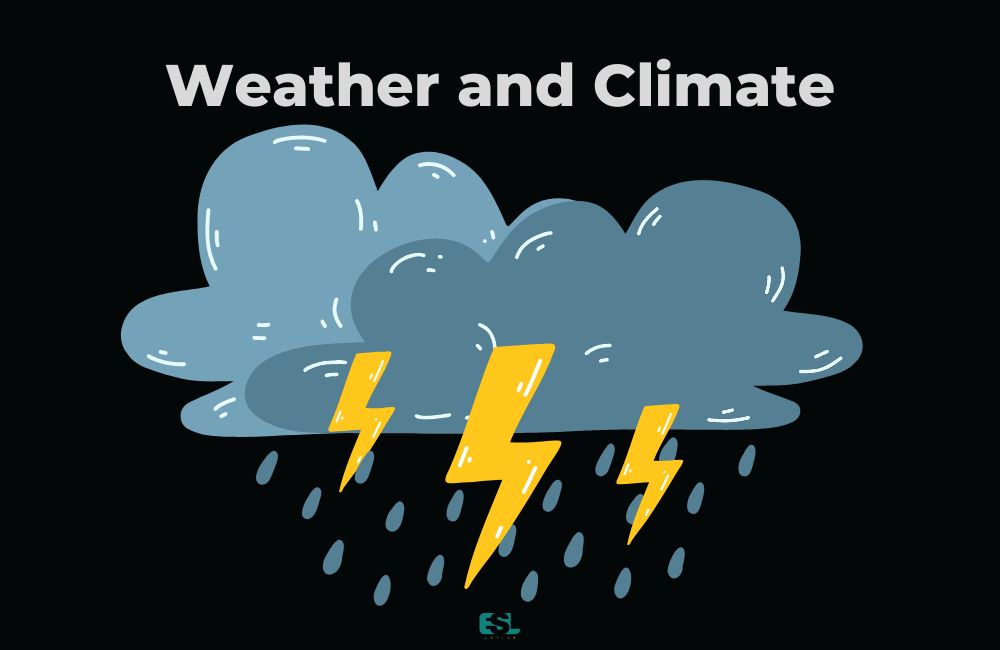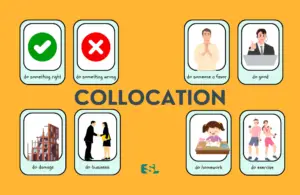Understanding and expressing various weather and climate conditions is a crucial aspect of communication in any language. The range of phrases and terms used to describe weather patterns is quite broad in English.
Knowing the right vocabulary to discuss weather and climate can enhance your conversational skills, whether you’re a student, an aspiring meteorologist, or someone planning a trip. This article explores the extensive vocabulary related to weather and climate, with an aim to make you proficient in using these words accurately.
Table of Contents
- 1. Basic Weather Terms
- 2. Severe Weather Conditions
- 3. Climate Types
- 4. Climate Change Vocabulary
- 5. Equipment and Instruments
- 6. Weather Forecasting
- 7. Idiomatic Weather Expressions
- Sample Conversation: Using Vocabulary Related to Weather and Climate
- Conclusion
- FAQ: Vocabulary Related to Weather and Climate
1. Basic Weather Terms
Let’s delve into some of the most common weather terms you might use in daily conversation.
| Word/Phrase | Meaning/Usage | Example Sentences |
|---|---|---|
| Sunny | A lot of sunlight, without clouds | “It’s a sunny day, perfect for a picnic.” |
| Cloudy | Full of or covered with clouds | “The sky is cloudy, I think it might rain later.” |
| Rainy | Characterized by heavy rainfall | “Remember to carry your umbrella, it’s a rainy day.” |
| Windy | Having a lot of wind | “It’s too windy to go for a walk today.” |
| Stormy | Characterized by strong winds and usually rain, thunder, lightning, or snow | “The weather forecast predicts a stormy night.” |
| Snowy | Having a lot of snow | “The snowy mountains look beautiful in winter.” |
| Humid | Containing a high amount of water or moisture | “The weather is extremely humid today, I can’t stop sweating.” |
| Dry | Without humidity or moisture, often used to describe a climate | “The desert is known for its dry climate.” |
| Mild | Not extreme, often used to describe comfortable weather conditions | “The weather is mild today, neither too hot nor too cold.” |
| Foggy | Filled with fog; not clear or visible | “Driving becomes difficult when it’s foggy.” |
| Hail | Frozen raindrops which fall as hard balls of ice | “The hail damaged the crops badly.” |
To elevate your vocabulary in just 30 days, I recommend to my students an informative, fun, and accessible guide to utilizing powerful language. Millions of individuals have enhanced their academics, job skills, and confidence by dedicating just fifteen minutes daily to the exercises and tests of 30 Days to a More Powerful Vocabulary (Amazon Link), a top-selling. It offers step-by-step methods to bolster language prowess, discover compelling words, and daily vocabulary enhancement with pronunciation guidance.
2. Severe Weather Conditions
While basic weather terms help in everyday communication, knowledge of terms describing severe weather conditions is essential for understanding weather warnings and reports.
| Word/Phrase | Meaning/Usage | Example Sentences |
|---|---|---|
| Hurricane | A violent wind, with a speed greater than 74 miles per hour | “The coast is preparing for a possible hurricane.” |
| Tornado | A mobile, destructive vortex of violently rotating winds | “The tornado left a trail of destruction in its wake.” |
| Tsunami | A long high sea wave caused by an earthquake or other disturbance | “The earthquake triggered a tsunami.” |
| Earthquake | A sudden violent shaking of the ground | “The earthquake caused significant damage to the city.” |
| Flood | An overflow of water onto normally dry land | “The river rose rapidly and caused a flood.” |
| Drought | A prolonged period of abnormally low rainfall | “The drought has severely affected the agricultural sector.” |
| Heatwave | A prolonged period of excessively hot weather | “The city has been experiencing a heatwave for the past week.” |
| Avalanche | A mass of snow, ice, and rocks falling rapidly down a mountainside | “Several climbers were trapped by an avalanche.” |
| Blizzard | A severe snowstorm with high winds | “The blizzard made roads impassable.” |
| Thunderstorm | A storm with thunder and lightning and typically also heavy rain | “The thunderstorm last night caused a power outage.” |
3. Climate Types
Climate refers to the weather conditions prevailing in an area over a long period. This section covers various climate types.
| Word/Phrase | Meaning/Usage | Example Sentences |
|---|---|---|
| Tropical | A non-arid climate in which all twelve months have mean temperatures of at least 18°C (64.4 °F) | “The tropical climate is suitable for growing crops like bananas and pineapples.” |
| Desert | A climate that receives an extremely low amount of precipitation, less than enough to support growth of most plants | “Living in a desert climate requires adaptation to the heat and dryness.” |
| Mediterranean | A climate typically with hot, dry summers and mild, wet winters | “The Mediterranean climate is perfect for growing olives and grapes.” |
| Temperate | A climate with moderate temperatures, not extremely hot or cold | “The temperate climate is comfortable for most people.” |
| Polar | A climate characterized by persistently low temperatures | “Polar climate is challenging for human habitation due to the extreme cold.” |
| Mountain | A climate that varies with altitude | “The mountain climate changes rapidly as you ascend.” |
| Rainforest | A climate characterized by heavy rainfall and high temperatures throughout the year | “The Amazon basin has a typical rainforest climate.” |
| Subtropical | A climate typically with hot summers and mild winters | “Citrus fruits thrive in a subtropical climate.” |
| Tundra | A type of biome where the tree growth is hindered by low temperatures and short growing seasons | “The Arctic region is characterized by a tundra climate.” |
| Monsoon | A seasonal reversing wind accompanied by corresponding changes in precipitation | “The monsoon climate is typical in the Indian subcontinent.” |
4. Climate Change Vocabulary
Climate change is a pressing issue worldwide. Here are some terms related to this topic.
| Word/Phrase | Meaning/Usage | Example Sentences |
|---|---|---|
| Global warming | An increase in the earth’s average atmospheric temperature that causes corresponding changes in climate | “Scientists are concerned about the effects of global warming.” |
| Greenhouse effect | The trapping of the sun’s warmth in a planet’s lower atmosphere | “The greenhouse effect is contributing to global warming.” |
| Carbon footprint | The total amount of greenhouse gases produced directly or indirectly by an individual or organization | “We can reduce our carbon footprint by using renewable energy.” |
| Emission | The production and discharge of something, especially gas or radiation | “Vehicle emissions contribute significantly to air pollution.” |
| Deforestation | The action of clearing a wide area of trees | “Deforestation is causing habitat loss for many species.” |
| Sustainable | Using methods that do not harm the environment | “We need to promote sustainable practices to protect the environment.” |
| Renewable energy | Energy from a source that is not depleted when used, such as wind or solar power | “Renewable energy is a viable solution to reduce dependency on fossil fuels.” |
| Fossil fuels | Natural fuel such as coal or gas, formed in the geological past from the remains of living organisms | “Burning fossil fuels releases large amounts of CO2 into the atmosphere.” |
| Ozone layer | A layer in the earth’s stratosphere containing a high concentration of ozone, which absorbs most of the ultraviolet radiation reaching the earth from the sun | “The depletion of the ozone layer is a major concern.” |
| Bio-diversity | The variety of plant and animal life in the world or in a particular habitat | “Climate change poses a serious threat to biodiversity.” |
5. Equipment and Instruments
Understanding weather-related equipment and instruments is also important. Here are some common terms.
| Word/Phrase | Meaning/Usage | Example Sentences |
|---|---|---|
| Thermometer | An instrument for measuring and indicating temperature | “The thermometer reads 30 degrees Celsius.” |
| Barometer | An instrument measuring atmospheric pressure | “The barometer indicates a drop in pressure; it might rain soon.” |
| Hygrometer | An instrument for measuring the humidity of the air or a gas | “The hygrometer shows high humidity today.” |
| Anemometer | An instrument for measuring the speed of the wind | “The anemometer shows that the wind is blowing at 15 miles per hour.” |
| Weather vane | A device showing the direction of the wind, typically used as an architectural ornament | “The weather vane is pointing east; the wind is coming from the west.” |
| Weather satellite | A type of satellite that is primarily used to monitor the weather and climate of the Earth | “Weather satellites help in predicting weather patterns.” |
| Weather balloon | A balloon which carries instruments aloft to send back information on atmospheric pressure, temperature, humidity and wind speed | “The weather balloon collects data from the upper atmosphere.” |
| Rain gauge | An instrument for collecting and measuring the amount of rain that falls | “The rain gauge helps in recording the amount of rainfall.” |
| Weather radar | A radar system used to locate precipitation, calculate its motion, and estimate its type | “The weather radar can detect an approaching storm.” |
| Weather station | A facility with instruments and equipment for observing atmospheric conditions | “The local weather station provides accurate weather forecasts.” |
6. Weather Forecasting
Understanding weather forecasting can help you plan ahead and be prepared. Here are some terms associated with it.
| Word/Phrase | Meaning/Usage | Example Sentences |
|---|---|---|
| Forecast | A prediction or estimate of future events, especially weather | “According to the forecast, it’s going to be sunny tomorrow.” |
| Meteorology | The science of weather, climate, and the atmosphere | “Meteorology involves the study of weather patterns and predictions.” |
| Weather report | A statement describing the current weather conditions | “According to the weather report, it will rain in the afternoon.” |
| Prediction | A thing predicted; a forecast | “The weather prediction is not always accurate.” |
| Weather map | A map showing the state of the weather over a large area | “The weather map shows a high-pressure area moving towards us.” |
| Doppler radar | A radar tracking system using the Doppler effect to determine the location and velocity of a storm, clouds, precipitation, etc. | “Doppler radar can help detect tornados.” |
| Satellite imagery | Images of Earth or other planets collected by satellites | “Satellite imagery provides a global view of weather patterns.” |
| Atmospheric pressure | The pressure exerted by the weight of the atmosphere | “Changes in atmospheric pressure can affect weather conditions.” |
| Cold front | The boundary of an advancing mass of cold air | “A cold front is coming in, which might lower the temperature.” |
| Warm front | The boundary of an advancing mass of warm air | “The warm front will likely bring some light rain.” |
7. Idiomatic Weather Expressions
Finally, English language uses a variety of idioms related to weather to express different situations. Here are some common ones.
| Word/Phrase | Meaning/Usage | Example Sentences |
|---|---|---|
| Rain cats and dogs | Rain heavily | “It’s raining cats and dogs; I think we should stay in.” |
| Break the ice | Start a conversation | “Let’s break the ice with a round of introductions.” |
| Under the weather | Feeling ill or low | “He’s feeling a bit under the weather today.” |
| In a fog | Confused | “I’m in a fog about these tax regulations.” |
| Storm in a teacup | A lot of unnecessary anger and worry about a matter that is not important | “Don’t worry about their argument—it’s just a storm in a teacup.” |
| Chase rainbows | Pursue unrealistic goals | “He’s trying to solve the problem by chasing rainbows.” |
| Steal someone’s thunder | Take the attention away from someone else’s achievement | “She stole my thunder by announcing her engagement at my graduation party.” |
| Snowed under | To have so much work that you have problems dealing with it all | “I’m totally snowed under with work at the moment.” |
| Every cloud has a silver lining | Every bad situation has some good aspect to it | “She didn’t win the competition, but every cloud has a silver lining; she’s been offered a modeling contract.” |
| On cloud nine | Extremely happy | “After hearing the good news, she was on cloud nine.” |
If you are searching for an effective English language vocabulary builder, try Word Power Made Easy: The Complete Handbook for Building a Superior Vocabulary (Amazon Link). This time-tested classic has helped millions achieve mastery of English and improve their communication skills in business, the classroom, and in life.
Sample Conversation: Using Vocabulary Related to Weather and Climate
Situation: On a breezy evening at a rooftop café, Clara and Neil chat about the changing weather patterns and their travel plans.
Clara: Neil, isn’t this “drizzle” quite unexpected for this time of the year? The “forecast” had predicted clear skies!
Neil: Absolutely, Clara. It seems the “climatic” changes are making weather predictions more challenging. I’ve noticed more “humidity” lately, even in what’s supposed to be the dry season.
Clara: True. And the “temperature fluctuations” are so extreme. Just last week, we had a “heatwave,” and now it feels like we’re on the verge of a “cold front.”
Neil: You’re right. And with the increasing “greenhouse effect,” I wonder how much “global warming” will impact our future travel plans.
Clara: Speaking of travel, I’m hoping to visit the Alps next winter. I’ve heard the “snowfall” there is breathtaking, especially during “blizzards.”
Neil: That sounds amazing! Just ensure you pack some “thermal” wear. The “wind chill” up there can be quite severe.
Conclusion
Understanding and utilizing this extensive vocabulary related to weather and climate can help you accurately describe the environment around you, understand weather reports, and even make your conversation more colorful with idiomatic expressions.
This enhances your English language skills and helps you stay informed and prepared for various weather conditions. Keep practicing and expanding your vocabulary, and soon you’ll find that talking about the weather is not just small talk but an important part of daily communication.
FAQ: Vocabulary Related to Weather and Climate
1. What is “drizzle”?
“Drizzle” refers to light rain with very fine, small droplets. It’s softer than regular rain and might not require an umbrella but can make surfaces slippery.
2. How is “forecast” significant for daily activities?
A “forecast” provides predictions about upcoming weather conditions based on meteorological data. It helps individuals and businesses plan activities, ranging from daily chores to significant events.
3. What does “climatic” mean?
“Climatic” pertains to the climate, which encompasses the long-term patterns and averages of temperature, humidity, and rainfall in a particular region.
4. How does “humidity” affect comfort levels?
“Humidity” is the amount of moisture in the air. High humidity can make temperatures feel hotter and can be uncomfortable, while low humidity can cause dry skin and respiratory issues.
5. What are “temperature fluctuations”?
“Temperature fluctuations” refer to variations in temperature over a specific period, which can be throughout the day or across seasons.
6. What defines a “heatwave”?
A “heatwave” is a prolonged period of excessively hot weather, which may also be accompanied by high humidity.
7. Can you explain the “greenhouse effect”?
The “greenhouse effect” is a natural process where certain gases in the Earth’s atmosphere, like carbon dioxide, trap heat, maintaining the Earth’s temperature. However, human activities have increased these gases, intensifying the effect and leading to global warming.
8. How does “global warming” impact the environment?
“Global warming” refers to the long-term increase in Earth’s average temperature due to human activities. It can lead to melting glaciers, rising sea levels, and more frequent extreme weather events.
9. What is the difference between “snowfall” and “blizzards”?
“Snowfall” is the precipitation of snow, while “blizzards” are severe snowstorms characterized by strong winds and reduced visibility due to blowing snow.
10. Why is “wind chill” significant in cold weather?
“Wind chill” is the perceived decrease in air temperature felt by the body due to the wind’s effect. It indicates how cold it feels when considering the cooling effect of the wind on damp skin.





